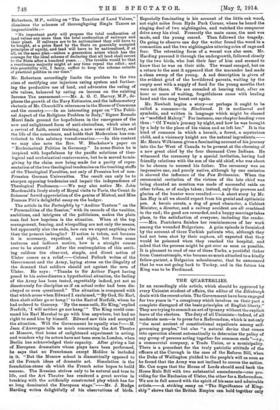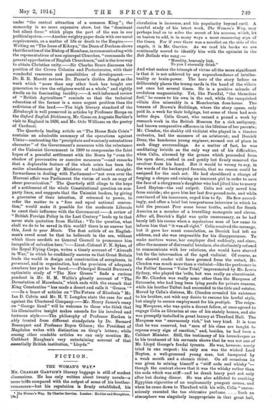THE QUARTERLIES.
in an exceedingly able article, which should be approved by every Unionist student of affairs, the editor of the Edinburgh deals with the recent crisis. The Government have been engaged for two years in "a conspiracy which involves on their part a complete disregard of the basic principles of English liberty." They are trying to commit an act of tyranny without the explicit leave of the electors. The duty of all Unionists—indeed, 'of all moderate men—is to press fora Referendum, which is not only "the most ancient of constitutional expedients among self- governing peoples," but also "a natural device that comes into operation almost automatically to determine the policy of any group of persons acting together for common ends "—e.g., a commercial company, a Trade Union, or a municipality. There is a precedent for the truly patriotic attitude of the officers at the Curragh in the case of the Reform Bill, when the Duke of Wellington yielded to the people's will as soon as he found that the Army was not inclined to coerce the nation. Mr. Cox urges that the House of Lords should send back the Home Rule Bill with two substantial amendments—one pro- viding for the Exclusion of Ulster, the other for a Referendum. We are in full accord with the spirit of his sane and admirable article.—A striking essay on "The Significance of King. ship" shows that the British Empire can bold together only under "the central attraction of a common King " ; the monarchy is no mere expensive show, but the "dominant but silent force" which plays the part of the sun in our politicalsystent —Another weighty paper deals with our naval requirements, as a matter of life or death to the Empire.— Writing on "The Issue of Kikuyu," the Dean of Durham shows that the action of the Bishop of Mombasa, in communicating with the representatives of non-episcopal Churches, "commands the general approbation of English Churchmen," and is the true way to obtain Christian unity.—Sir Charles Bruce discusses the position of the Crown Colonies and Protectorates, with their wonderful resources and possibilities of development.— Dr. R. R. 3farett reviews Dr. Frazer's Golden Bough as the work which " more than any other book has taught our generation to view the religious world as a whole," and rightly dwells on its fascinating lucidity.—A well-informed review of "British Agriculture" reminds us that the technical education of the farmer is a more urgent problem than the redivision of the land.—The high literary standard of the Edinburgh is well preserved in articles by Professor Hoops on the Oxford English Dictionary, Mr. Geese on Auguste Barbier's visit to England in 1836, and Mr. Orb° Williams on the poetry of Carducci.
The Quarterly leading article on " The Home Rule Crisis" contains an admirable summary of the operations against Ulster—contrasting the "precipitate andwtuttonly ostentatious character" of the Government's measures with the reluctance of the Unionist Government in 1899 to compromise the faint hopes of a peaceful settlement with the Boers by "even the shadow of provocative or coercive measures "—and remarks that a deplorable feature of the whole crisis has been the entire abandonment by Ministers of traditional straight- forwardness in dealing with Parliament—"not even over the Marconi affair was Parliament the victim of such an orgy of sheer prevarication." The Quarterly still clings to the hope of a settlement of the whole Constitutional question on non- party lines, and suggests that the Unionist leaders, by giving a guarantee of their intention, if returned to power, to refer the matter to a " free and equal national conven- tion," would make it possible for the moderate Liberals to exert their influence with the Government.—A review of "British Foreign Policy in the Last. Century " leads up to that never stale quotation from Halifax : "To the question, what shall we do to be saved in this world P there is no answer but this, Look to your Moate. The first article of an English- man's creed must be that he believeth in the sea, without which there needeth no General Council to pronounce him incapable of salvation here."—Lieut.-Colonel F. N. Sykes, of the Royal Flying Corps, writes a timely account of " Aircraft in War," in which he confidently assures us that Great Britain leads the world in design and construction of aeroplanes, in personnel, and in organization, but the provision of adequate numbers has yet to be faced.—Principal Ronald Burrows's optimistic study of "The New Greece" finds a curious pendant in Mr. H. M. Wallis's ghastly account of "The Devastation of Macedonia," which ends with the remark that King Constantine " has made a desert and calls it 'Greece. " —In a brace of articles on "The Future of Rhodesia" Mr. Ian D. Colvin and Mr. H. T. Longden state the case for and against the Chartered Company.—Mr. Henry James's essay on " George Sand" will be welcome to those who think that his illuminative insight makes amends for his involved and tortuous style.—The philosophy of Professor Eucken is ably treated from different standpoints by Dr. Bernard Bosanquet and Professor Boyce Gibson; the President of Magdalen writes with distinction on Gray's letters; while among other readable articles we can only mention Mr. Cuthbert Maughan's very entertaining account of that .essentially British institution, "Lloyds."















































 Previous page
Previous page